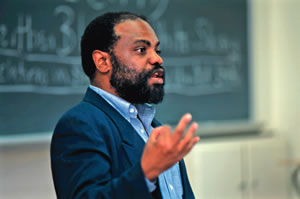It will support campus programs related to diversity
 An endowed fund honoring the late Gerald Gill ’70 will support campus speakers and other programs addressing issues related to diversity. It is being established by College trustee Joseph Cox ’68 in memory of his former Lafayette roommate.
An endowed fund honoring the late Gerald Gill ’70 will support campus speakers and other programs addressing issues related to diversity. It is being established by College trustee Joseph Cox ’68 in memory of his former Lafayette roommate.
Profile: “Constant Struggle”
The McDonogh Report celebrates the contributions of African Americans to the Lafayette community
Gill’s impact was profound in 27 years on the history faculty at Tufts University, which was shaken by his sudden death of arterial sclerosis in July. Tufts president Lawrence Bacow said, “Thoughtful, soft-spoken, and incredibly generous with his time . . . he always pushed Tufts to be a better place, a more inclusive place, one that is welcoming to all.”
The Boston Globe said, “His classes filled to capacity, and yet he memorized the name of each student. . . . He took pains to bridge the gaps between various ethnic communities on campus.” Gill’s faculty colleague Jeanne Marie Penvenne told the Globe, “He touched everyone. I can think of a score of young black men for whom he was a role model, a mentor; he never let them down. And I can say the same for many young white men and young Asian-American men.”
Gill was the inaugural recipient of the university’s Arts and Science Multicultural Service Award. The Pan-African Alliance named him an honorary graduate, and the Africana Center renamed its annual award in his honor. The award recognizes efforts to create an environment where the contributions of people of African descent are celebrated in a diverse approach to learning inside and outside of the classroom.
Gill did groundbreaking research on the history of African Americans at Tufts and of race relations and black protest activities in Boston. Twice named Massachusetts Professor of the Year, he was co-editor of The Eyes on the Prize Civil Rights Reader.
At Lafayette, Gill was among the students who formed the Association of Black Collegians in 1968. As a senior, he was on Student Council and president of ABC, which issued a manifesto demanding more black students and faculty, a black studies curriculum, and a black social center. In March 1970, about 25 black students met with several trustees, and the following month the board approved the establishment of a Black Cultural Center.
“I do appreciate the education I got from Lafayette, and I’m proud of it,” Gill said last year.
Cox was a “conservative from an ROTC background” and Gill “a young, black liberal,” but they formed a close friendship that was influenced by the turbulent times. “I learned a lot about the world being Gerry’s roommate. Being able to see things through his eyes helped shape my view of the world,” says Cox, who rose to the rank of colonel and taught English at West Point during a 20-year army career and is now headmaster of The Haverford School.
The fund will support activities focusing on “multiculturalism and the richness that is inherent in a diverse education,” Cox says. For information on contributing, contact Gary Carney, director of development, (610) 330-5573 or carneyg@lafayette.edu.
